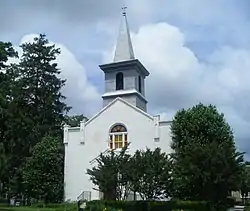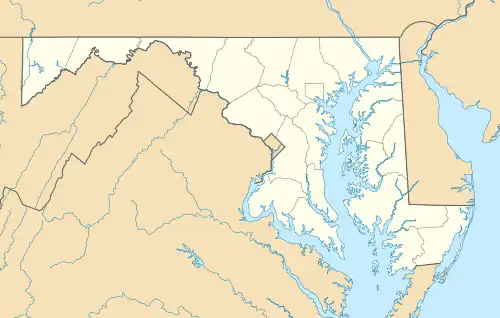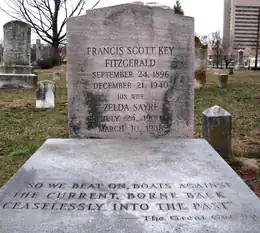Third Addition to Rockville and Old St. Mary's Church and Cemetery | |
 St. Mary's Church | |
  | |
| Location | Veirs Mill and Old Baltimore Rds., Rockville, Maryland |
|---|---|
| Coordinates | 39°4′56″N 77°8′44″W / 39.08222°N 77.14556°W |
| Area | 7 acres (2.8 ha) |
| Built | 1817 |
| Architectural style | Italianate, Queen Anne, Georgian |
| NRHP reference No. | 78001476[1] |
| Added to NRHP | November 20, 1978 |
The Third Addition to Rockville and Old St. Mary's Church and Cemetery is a historic area located in Rockville, Montgomery County, Maryland. This area combines 19th century residential scale buildings with a tree-lined narrow street, country church, weathered headstones, Victorian Gothic railroad station, and a brick cast-iron front commercial structure, to create an atmosphere that evokes the era when the station served as the gateway to Rockville. In addition to Victorian Gothic, architectural styles used in residential buildings include Queen Anne, Georgian, and Colonial Revival. The area was listed on the National Register of Historic Places in 1978.[1]
St. Mary's Church is significant as the County's first brick Roman Catholic church, and the handsome hardware store is the area's last surviving cast-iron brick commercial structure.[2] The Old St. Mary's Church Cemetery is the final resting place of author F. Scott Fitzgerald, his wife Zelda Fitzgerald and their daughter Frances Fitzgerald.
Gallery
 St. Mary's Church Cemetery. Author F. Scott Fitzgerald is buried there along with his wife Zelda
St. Mary's Church Cemetery. Author F. Scott Fitzgerald is buried there along with his wife Zelda Fitzgerald grave
Fitzgerald grave The old Wire Hardware Store
The old Wire Hardware Store
References
- 1 2 "National Register Information System". National Register of Historic Places. National Park Service. July 9, 2010.
- ↑ Anne Cissel; Mead Karras; Eileen McGuckian & Michael Patterson (December 1976). "National Register of Historic Places Registration: Third Addition to Rockville and Old St. Mary's Church and Cemetery" (PDF). Maryland Historical Trust. Retrieved January 1, 2016.
External links
- Third Addition to Rockville and Old St. Mary's Church and Cemetery, Montgomery County, Inventory No.: M: 26-12, M: 26-12-6, including photo in 2003, at Maryland Historical Trust website
- Boundary Map for Third Addition to Rockville and Old St. Mary's Church and Cemetery, Montgomery County
- Peerless Rockville Information Page
- "Gatsby author's final resting place is at St. Mary's Cemetery, Rockville", My Catholic Standard, by Carol Zimmermann, July 20, 2010.


